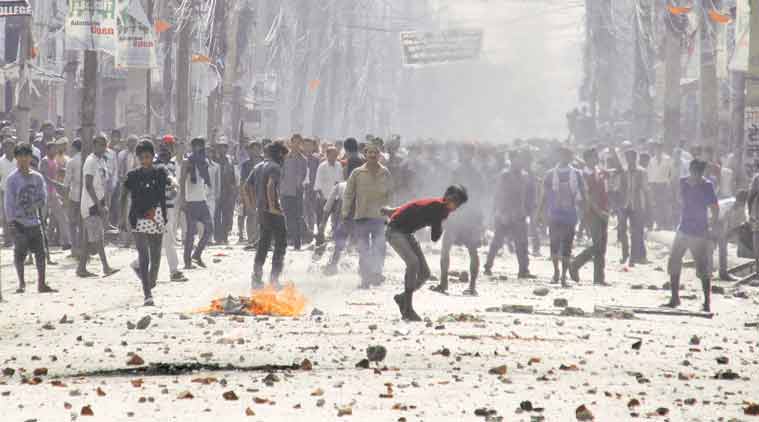Nepal Amends Constitution, Delhi Happy
Madhesi protesters throw stones at police in Nepal's Birgunj town

NEW DELHI: In a move that seeks to end the five month standoff with the Madhesi community that has in turn crippled supply lines into Nepal, the country’s government has agreed to amend its newly appointed constitution and address two key demands of the protestors -- specifically proportional representation and constituency delimitation.
New Delhi, that has been critical of Nepal’s new constitution and has seen a dip ties with the Himalayan neighbour, welcomed the move, with the MEA issuing a statement that reads, “Government of India welcomes these developments as positive steps that help create the basis for a resolution of the current impasse in Nepal. As a neighbour and well-wisher, India was deeply concerned at the unrest stemming from internal differences in Nepal on the Constitution. We urge all Nepali political forces to now demonstrate the necessary maturity and flexibility to find a satisfactory solution to the Constitutional issues through constructive dialogue in an agreed timeframe.”
The amendments will provide for participation in state organs on the basis of proportionate inclusiveness and delineation of electoral constituencies on the basis of population. Demarcation of provinces is to be addressed through an arrangement in the constitution based on political consensus. Other demands such as citizenship will be resolved through dialogue and negotiations.
The move comes as protests by the Madhesis took a violent turn over the weekend, when a 17 year old student was killed and four people injured as supporters of the United Democratic Madhes Front (UDMF) clashed with the police at Gaur.
It is reported that Nepal’s Deputy Prime Minister and Foreign Minister Kamal Thapa informed India’s External Affairs Minister Sushma Swaraj of the decision to amend the constitution on Monday, raising hopes in Kathmandu that the move would lead to a thaw in India-Nepal relations and most importantly, the resumption of trade and supplies from India which have been stalled for almost 12 weeks. India has pointed a finger at the agitating Madhesis for the ‘unofficial blockade’ whereas many in Nepal feel that their southern neighbour is more displeased by the decision to declare Nepal a secular country instead of a Hindu Rashtra.
India welcoming the move is a big step, as relations between the two historically close countries had reached an all time low over the new constitution, with Indian Ambassador to Nepal Ranjit Rae expressing concern over the growing “anti India” sentiment in Nepal. "We sense that this is being used for certain objective -- political or otherwise,” Rae said, adding, “There is a section which is encouraging anti-India sentiment as it helps them in some way.”
In connection with the above, India reportedly imposed an ‘unofficial’ blockade at the Birgunj trade checkpoint, effectively cutting off vital supplies -- including petroleum products -- to Nepal.
India denied imposing a blockade, saying that the restrictions on movement of goods and supplies was linked to security concerns over the violence led by the Madhesis along the border.
Nepal, however, maintained that India had imposed a blockade. "Continued obstruction at border customs points and the IOC halting supply of petroleum products have created an abnormal situation in fuel supply," Nepal’s home ministry said in a statement.



